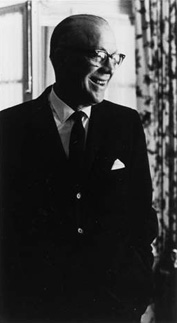 MILTON S. EISENHOWER, widely regarded as a leader of great vision, holds the distinction of having served two nonconsecutive terms as president of Johns Hopkins University. After serving from 1956 to 1967–a period in which the university’s income tripled and the endowment doubled–he retired and was named president emeritus. During his tenure, the medical institutions underwent major expansion and a new library and athletic center were added at Homewood. He returned to the presidency again, in 1971-72, and is credited with restoring a sense of unity to the university. The youngest brother of U.S. President Dwight D. Eisenhower, Milton Eisenhower died in 1985.
MILTON S. EISENHOWER, widely regarded as a leader of great vision, holds the distinction of having served two nonconsecutive terms as president of Johns Hopkins University. After serving from 1956 to 1967–a period in which the university’s income tripled and the endowment doubled–he retired and was named president emeritus. During his tenure, the medical institutions underwent major expansion and a new library and athletic center were added at Homewood. He returned to the presidency again, in 1971-72, and is credited with restoring a sense of unity to the university. The youngest brother of U.S. President Dwight D. Eisenhower, Milton Eisenhower died in 1985.
Return
to All Schools